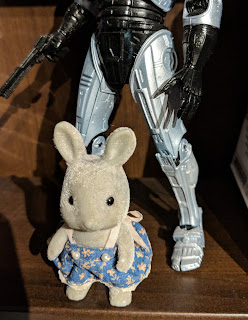Mrs. Frisby and the Rats of NIMH
Mrs. Frisby and the Rats of NIMH
Robert C. O'Brien, 1971
Robert C. O'Brien, 1971
A few months back I re-watched the animated movie adapted from this book, and it lead to a strong desire to reread the book. The movie, Secret of NIMH, is fine for what it is, but the book is far more subtle.
And there's no magic.
And the plot is much less melodramatic.
The things I found most striking re-reading this book was how even-handed it was. The scientists who turn the rats into super-rats are perhaps unthinking, but well-meaning, and they care for their lab animals. The farmers only want to drive out the rats because they steal. The owl makes Mrs. Frisby understandably nervous, but is generally courteous to her. The only openly cruel character is Dragon the cat.
Mrs. Frisby is a widowed mouse caring alone for her kids. She is naturally timid, as a mouse is, but when needed becomes brave and strong, running risks that go against her instincts, for the sake of her family. (The rats only help her because of their prior relationship with her husband, but they do have their own worries.)
“You forget,” Mrs. Frisby said, “I'm Timothy's mother. If you, and Arthur, and others in your group can take risks to save him, surely I can, too.”Ah, the story of the rats of NIMH. The Frisby family is the main plot, but the history of the rats is half the book. I love their journey from wild, to lab rats, to escapees, to slowly exploring their new potential. Altered by science, they are intelligent and long-lived, and they decide they can do better than living on the fringe of human society. At the end they are on their way, hopefully to build a city of intelligent rats, somewhere where humans almost never go. It's not mentioned explicitly, but implied that Nicodemus is smart enough to realize that eventually the rats could be found out, and if that happens, they need to be both independent from human society (not thieves), and able to prove by example that they deserve to continue to exist. Willingly giving up living off human food, building their own structures, and hoping to be left in peace long enough to develop a true civilization of rats are an admirable and ambitious set of goals.
“There could be room enough for a thousand of us”The end of the book was rather sudden, and not all questions are answered, but not in a bad way.
“There aren't a thousand of us.”
“There might be, someday”
“But why? Why move?....We've got all the food we want. We've got electricity, and lights, and running water....”
“Because everything we have is stolen.”
“That's silly. Is it stealing when farmers take milk from cows, or eggs from chickens? They're just smarter than the cows and chickens, that's all. Well, people are our cows. If we're smart enough, why shouldn't we get food from them?”
“It's not the same. Farmers feed the cows and take care of them.... Besides, if we keep it up, we're sure to be found out.” -Nicodemus and Jenner
4 Stars - A Really Good Book
Animal Society Rundown:
Overall: Separate 'nature'-based animal society
The 'normal' animals have a loose association where they may help each other out, but keep mostly to themselves. The Rats, on the other hand, are consciously building a fair, communal society.
Size: Real, with extenuating circumstances
Mrs. F, the birds, shrews, etc are all normal size animals, the Rats are larger than normal rats.
Law and Order: unclear/democratic
The Rats govern themselves in a vaguely democratic way, they vote on major issues, the group that disagrees with the larger body exiles themselves. The other animals don't seem to have an overall system beyond an understanding of the seasons, the food chain, etc. Each keeps to its own. Most animals see no problem with stealing from humans, taking leftover food where it appears.
Own language: Yes, cannot speak to humans.
Animals can speak across species boundaries. The cat is the only animal who does not speak to the others. The animals on the farm can understand human speech. The Rats (and Mr. Ages, Mr. Frisby, and the Frisby kids) learn to read human language, but are only rodents, they cannot speak it.
Own religion: None Stated
Aside from a moral quoted more than once: “We all help one another against the cat.”
Other Notes: Rats fond of stuff, but not clothing.
The Rats build themselves quite a base, complete with lighting, an elevator, furniture, rat-sized books (I have no idea how they did that), ventilation, they have designed and built rat-sized plows...Their supplies are stolen and items built with a high level of sophistication. The Frisby family is described to have blankets and a simple table made of a bit of discarded wood, but their home is makeshift and furnished with found natural items. Nicodemus is described as having an eyepatch, but none of the other animals are said to wear any clothing.
Level of Anthropomorphism: Aspiring
The rats are consciously attempting to build their own society, pulling what they like from human technology and history (and attempting to learn from what they dislike). The climactic trip to Thorn Valley is the first big step toward their final goal of being self-sufficient, to stop stealing from humans. The other animals are basically just living their lives.
Side Note: Of course, rats are in truth quite smart, and I have a certain affection for them. I also highly recommend the nonfiction book Rats: Observations on the History and Habitat of the City's Most Unwanted Inhabitants. My first pet rat was named Isabella, after a young rat Mrs. Frisby meets studying in the library.



Comments
Post a Comment
FYI: Most comments are moderated, and will not appear immediately.